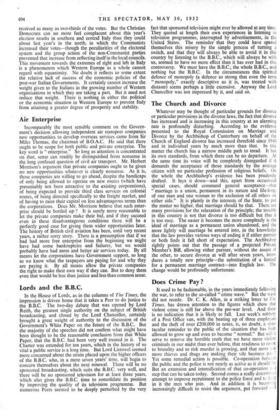The Church and Divorce
Whatever may be thought of particular grounds for divorce or particular provisions in the divorce laws, the fact that divorce has increased and is increasing in this country at an alarniing rate is profoundly diiturbing. According to the evidence presented to the Royal Commission on Marriage and Divorce by the Archbishop of Canterbury on behalf of the Church of England divorce has increased threefold since 1940 and in individual years by much more than that. In this matter the church has a narrow middle path to tread. It has its own standards, from which there can be no departure. At the same time its voice will be completely disregarded if it demands the acceptance of those standards by the average citizen with no particular profession of religious beliefs. On the whole -the Archbishop's evidence has been prudently drafted. It lays it down—and this, apart from occasional special cases, should command general acceptance—that " marriage is a union, permanent in its nature and life-long, of one man and one woman to the exclusion of all others on either side." It is plainly in the interests of the State, to put the matter no higher, that marriage should be that. There are many provisions for the relaxation of the principle; the trouble in this country is not that divorce is too difficult but that it is too easy. The easier it becomes the more completely is the ideal of marriage as a permanent union abandoned, and the more lightly will marriage be entered into, in the knowledge that the law provides various ways of ending it if either partner or both finds it fall short of expectation. The Archbishop rightly points out that the passage of a projected Private Member's Bill, allowing either partner, without the assent of the other, to secure divorce at will after seven years, intro- duces a totally new principle—the substitution of a limited for a permanent marriage contract—into English law. The change would be profoundly unfortunate:










































 Previous page
Previous page